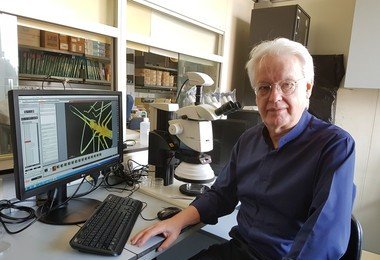KE Spotlight
Filter
-

HKU partners with Cyberport to set up digital tech entrepreneurship platform to support start-ups
HKU and Hong Kong Cyberport signed a memorandum of understanding to set up the HKU x Cyberport Digital Tech Entrepreneurship Platform to provide support to digital tech start-ups spanning the aspects of human capital, innovation and technologies, entrepreneurship, and legal and business expertise. At the launch of HKU's FinTech Nucleus at Cyberport, SHIELD, a cyber security technology developed by the HKU Center for Information Security and Cryptography was showcased. A portfolio optimisation software "PORTimizer®" and MPF mobile app "MPF Optimal Allocation" developed by the Department of Statistics and Actuarial Science was also demonstrated.
Read More -
HKU and Kyoto U reveal a new strategy to enhance the efficiency of cereal straw for biofuel production
Researchers from HKU and Kyoto University (Kyoto U) revealed a new strategy to allow cellulose in rice straw to release its fermentable sugar more efficiently. Currently, expensive and complicated procedures are required to loosen lignin, a complex polymer which provides mechanical strength and structural integrity in plants, in order to utilise cellulose more efficiently during the production of bioethanol. According to the findings by HKU plant biochemists Dr Clive Lo Sze-chung and Dr Lydia Lam Pui-ying and Kyoto U lignin specialist Dr Yuki Tobimatsu, when flavone synthase II (FNSII), a key enzyme involved in tricin synthesis was knocked out, the lignin content in rice straw was reduced by approximately one-third, the yield of glucose from cellulose degradation was increased by 37% without any chemical treatment. In other words, the efficiency of ethanol production can be enhanced at a lower treatment cost for lignin.
Read More -

HKU Stephen Hui Geological Museum holds exhibition on private mineral collections in Hong Kong
The HKU Stephen Hui Geological Museum will hold in collaboration with the Mineralogy Society of Hong Kong a "Mineral Collections in Hong Kong" exhibition from March 3 to August 31, to showcase over 200 precious minerals from 18 private collectors in Hong Kong. The exhibits include one of the best gemmy single crystals of Tanzanite from Merelani Mine, a very rare large gem quality Aquamarine on Albite with large fluid inclusions from Balochi, Gilgit-Baltistan, Pakistan, and a 18 cm large gemmy Rhodochrosite on Quartz from the famous Sweet Home Mine in Colorado, U.S.A.. The mineral display cabinet of the late Dr Stephen Hui Sze-fun with a selection from his private collection is also included.
Read More -

HKU conducted the first demographic study of the Chinese white dolphins in the Pearl River Estuary and urges conservation of dolphin critical habitat
A demographic study of the Chinese white dolphins inhabiting the Pearl River Estuary, led by Dr Leszek Karczmarski, Associate Professor at the HKU School of Biological Sciences, revealed that the PRE dolphin population is declining approximately 2.5% per year and is fast approaching its viability threshold. The findings indicated that the PRE dolphin population is deemed to become extinct unless effective conservation measures can rapidly reverse the current population trend.
Read More -
HKU study reveals Hong Kong hosts more than ¼ of all marine species recorded in China
Hong Kong has a record of 5,943 marine species, according to a recent review by a research group led by Professor Gray A. Williams of The Swire Institute of Marine Science (SWIMS) and School of Biological Sciences of HKU. This first comprehensive review of local marine biodiversity shows that with only about 1,651 km2 marine area (~0.03% of China's total), Hong Kong already accounts for ~26% of the total marine species recorded in China. However, currently only less than 2% of Hong Kong’s marine area is protected as marine parks or reserve. The research team urged the government to move towards the global target of at least 10% marine protected area by the year 2020 under United Nation's Convention on Biological Diversity (CBD). To establish a platform for the international scientific community to access the marine species in Hong Kong for conservation, research and education purposes, the research team, in collaboration with international experts, has also launched the Hong Kong Register of Marine Species (HKRMS) under the umbrella of the largest global marine biodiversity database, the World Register of Marine Species (WoRMS). Hong Kong is one of only ten regions in the world that has such a regional species database, and was the first in Asia.
Read More -

International study reveals 82% of core ecological processes compromised by climate change
An international study led by University of Florida, with participation from the HKU School of Biological Science, revealed that 82% of the 94 identified ecological processes have been compromised by climate change. Land, freshwater and marine ecosystems and species have all been all affected, and consequential impacts on people could range from increased pests and disease outbreaks, to unpredictable changes in fisheries and decreasing agriculture yields. Co-author Professor David Dudgeon, Director of the School of Biological Sciences, warned that local species like paradise fish, short-legged toad and Hong Kong newt are at risk as habitats shrink. The research team hopes the research could steer governments in the right direction and deliver the message that climate change is not just a projection and that the effects on ecological processes are already happening. The study was published in the prestigious journal Science.
Read More -
Knowledge Exchange Awards 2016
The annual Faculty Knowledge Exchange (KE) Awards recognize each Faculty's outstanding KE accomplishment that has made demonstrable economic, social or cultural impacts to benefit the community, business/industry, or partner organizations. The KE Award (Non-Faculty Unit) was introduced with the same objective for the independent centres, institutes and units of the University. Results of the 2016 KE Awards are now available.
Read More

